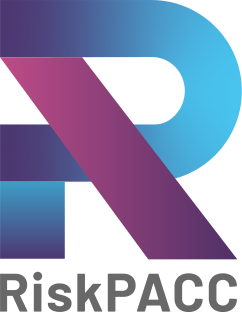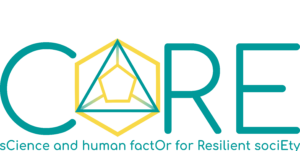DRS-01 Cluster
RiskPACC established a continuous liaison with five complementary EU projects (LINKS, ENGAGE, BuildERS, CORE and RESILOC), funded under the same topic SU-DRS01-2018-2019-2020 – Human factors, and social, societal, and organisational aspects for disaster-resilient societies. Clustering activities among the projects will help them communicate their results, increase their visibility to a wider audience and share experiences and common practices. Here are more details about the Clustering projects:
LINKS “Strengthening links between technologies and society for European disaster resilience” is a comprehensive study on disaster governance in Europe. The overall aim of the LINKS project is to strengthen links between technologies and society for improved European disaster resilience, by producing sustainable advanced learning on the use of social media and crowdsourcing (SMCS) in disasters. In recent years, social media and crowdsourcing (SMCS) have been integrated into crisis management for improved information gathering and collaboration across European communities. The effectiveness of SMCS on European disaster resilience, however, remains unclear owing to the diversity among disaster risk perception and vulnerability (DRPV), disaster management processes (DMP) and disaster community technologies (DCT) across Europe today. From this point of departure, LINKS sets out to achieve four core objectives:
- Produce sustainabile advanced learning on SMCS in disasters
- Achieve a consolidated understanding of SMCS in disasters
- Govern the diversity of SMCS in disasters
- Bring multidisciplinary SMCS stakeholders together
In actual times, climate change and evolving global assets are changing the nature of hazards and their predictability. Societies and all individuals are demanded to be able to rapidly respond to growing natural and man-made disasters. ENGAGE is an EU-funded project, started in July 2020, whose mission is to provide novel knowledge, impactful solutions and emergency response guidelines for exploiting Europe ́s societal resilience. Solutions will aim at bridging the gap between formal and informal approaches to risk and emergency management, increasing the ability of communities to adapt before, during and after disaster.
The actual global scenario is increasingly exposing the human society to higher hazards, requiring that all individuals specifically and the civil society at large, acquire the ability to rapidly respond to natural disaster and to man-made risks. Risk awareness is indeed a strong priority for modern societies and social resilience is necessary to enhance successful responses to unexpected emergencies.
In the actual strategies there is a gap between the formal effort of public authorities to protect citizens from harm and the voluntary support provided by citizens during emergencies. Starting from this awareness ENGAGE addresses the whole society and tries to bridge the different ways of intervention to make communities more skilled in responding to disasters jointly and therefore more resilient. The project will analyze past natural emergencies, terrorist attacks, and man-made disasters to understand how citizens supported formal intervention practices during emergencies under specific contextual conditions.
Together with real practitioners from their Knowledge and Innovation Community of Practice (KI-CoP), ENGAGE proposes emergency response strategies to bring the population closer to rescuers and authorities, bridging the gap between formal and informal guidelines in specific contexts.
Funded by the European Union’s H2020 research and innovation programme, BuildERS works on increasing the societal resilience and social capital of European communities and citizens. It will do this by genuinely co-designing processes and tools with citizens, first-responder organisations and technology tools developers. The project will incorporate an inclusive and interactive research and analysis process, where the results are not derived ‘top-down’ but through a ‘bottom-top’ dynamic interaction.
The objectives:
- Providing an understanding of how the most vulnerable people exposed to risks and threats understand risks,
prepare for and behave individually and collectively in crisis. - Creating knowledge to empower and activate first-responders, policy makers, administrators, public and private
service providers and citizens. - Analysing and providing insights on how new technologies and media could improve disaster resilience of societies.
- Providing policy recommendations to the relevant stakeholders to maximize the usability and reliability of social media
in disasters and recovery processes.
CORE (sCience & human factOr for Resilient sociEty) is a multi-disciplinary consortium established to understand how to define common metrics with respect to the different natural and man-made disaster scenarios, and how to measure, control and mitigate the impact on the populations, particularly on vulnerable groups: disabled, elderly, poor, as well as women and children. It contributes to Horizon 2020’s focus on secure societies where citizens are facing increasingly threatening situations. Recent natural and manmade disasters have shown gaps in the level of preparedness of European society for disasters, highlighting the importance of increasing risk awareness, which ensures a direct positive impact on citizen and organisational resilience among people and decision-makers in Europe. CORE will identify and use best practice and knowledge/learning from certain countries, such as Japan which experienced high levels of seismic, volcanic and tsunami risks but where risk awareness is high. It will provide optimized actions and solutions to help restructure and rebuild socio-economic structures after a disaster, across and outside Europe (Israel, India & Japan), where it will have access, through the end-users, to the relevant base of knowledge. CORE will lead to more efficient and effective policies, governance structures and broad awareness and collaboration among citizens, as well as between citizens and rescue agencies. Best practice and best procedures will be identified and reported to policymakers, end-users and disseminated to all stakeholders and NGOs. CORE will devote great attention to education in schools, making the young generation a sort of “prevention sentinels”.
The overall goal of RESILOC is to identify new strategies for improving on the processes of preparedness of local communities against any kind of hazards, either planned or unplanned.
The project aims at bringing together the validity and experience of local communities and the strategies and commitment of national and supra-national actors to achieve a tangible impact on the way resilience is understood and increased in local communities.
Therefore a holistic framework of studies, methods and software instruments will be developed, that combines the physical with the less tangible aspects associated with human behavior that applies at the community scale.
This project has received funding from the European Union’s Horizon 2020 research and innovation programme under grant agreement No. 101019707. This webpage reflects only the author’s view and the Research Executive Agency (REA) and European Commission cannot be held responsible for any use that may be made of the information it contains.





